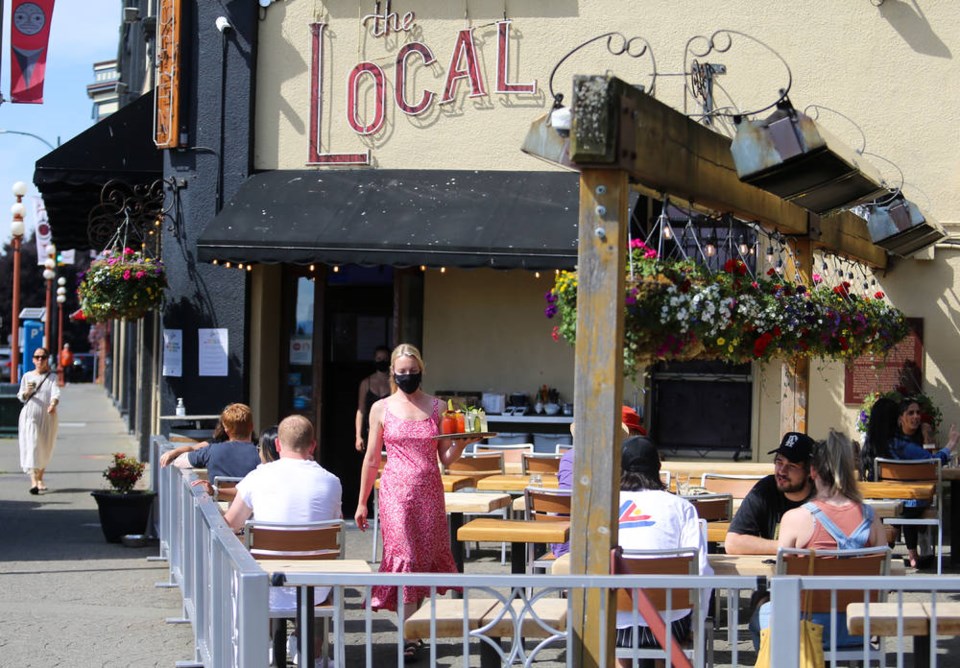Workers at the lowest end of the wage spectrum will have a little more cash in their pockets this week as B.C.’s minimum wage increases today to $15.20 an hour.
The increase from $14.60 an hour is the final step in a four-year government pledge to raise the minimum wage from $11.35 an hour to at least $15 an hour by June 2021.
“As of tomorrow, we will have achieved and surpassed that goal, making sure workers who need regular and fair wage increases are getting them,” Labour Minister Harry Bains said Monday.
The new minimum, the highest in Canada, is expected to affect 250,000 workers and includes an increase of $1.25 an hour for liquor servers, who had been getting a minimum of $13.95 an hour.
Advocates for a living wage called it a good start, and some business owners warned that prices will have to increase to absorb the cost.
“It will be tough, no doubt about it,” said Rob Chyzowski, owner of Bellevilles Watering Hole and Diner, noting many of his servers have been getting the $13.95 wage, though he has been paying kitchen staff and others well above minimum wage for years.
Chyzowski said with as many as 90 employees, he could be looking at the monthly wage bill increasing by more than $7,500.
“It’s significant and how do you get that money back?” he asked. “We just re-opened indoor dining, and we’re still at just 50 per cent capacity.”
Ian Tostenson, chief executive of the B.C. Restaurant and Foodservices Association said the cost pressure of a higher minimum wage adds to increased overhead costs, food costs and safety equipment.
“This [increase] will just get baked into pricing, invariably we will see prices go up in restaurants to cover this,” he said. “There are some who will say this shouldn’t be happening now [while we’re in a pandemic] but others will say they had already baked this into their business models — it’s been four years in the making and everyone was aware it was coming.”
Mike Murphy, owner of the 10 Acres Group, which owns restaurants in downtown Victoria and Sidney, said the increase shouldn’t surprise anyone. “Take a look around, everything is more expensive than it was eight months ago,” he said. “There’s no question prices will go up across the board.”
It won’t change his bottom line much, he said, noting they haven’t had anyone making less than $20 an hour in their kitchens for more than four years.
“A few years ago we put an ad in for a dishwasher at $20 and didn’t get an application,” he said. “And I’m in full agreement with our staff being paid that, they deserve to get paid that, they are great and work harder than a lot of people do making more than that.”
Annie Dormuth, provincial affairs director of the Canadian Federation of Independent Business, said the impact will be felt beyond the hospitality industry, also affecting convenience stores, retailers and family businesses. “For any small business, taking on added cost increases [in a pandemic] will be difficult,” she said, noting only 40 per cent of B.C. small business report having normal sales figures.
She said even though the increases were mapped out, no business could have planned to have 18 months of a pandemic. “We would have liked to see government hit the pause button on the increase or perhaps reduce or offset costs.”
For those receiving the increase it could be a game changer.
“The minimum wage going up makes a huge difference for my family and my co-workers,” said Alfiya Ishak, who works as a cleaner. “Every year things go up in cost: groceries, bills and the rent. If the minimum wage doesn’t increase, how are we supposed to survive?”
Erica Jones, who works in the grocery business, said it will make it easier for people to pay their rent and other bills. “It is a step in the right direction but only one tool in the kit to bring people out of poverty,” she said. “People who make the minimum wage work as hard as anyone else.”
Anastasia French, organizer with the Living Wage for Families Campaign noted the $15.20 rate is still $4 below the estimated cost of living in Victoria. “We’ve seen during the pandemic that it is low-wage workers who are on the front line — keeping us fed, keeping us cared for, and keeping us safe. At the very least, they need to be earning a living wage,” she said.
B.C. Green Party Leader Sonia Furstenau noted the province has the highest cost of living and the highest levels of wealth inequality in Canada. “A strong economy is one where everyone can meet their basic needs and live healthy and fulfilling lives,” she said.
Greater Victoria Chamber chief executive Bruce Williams said in order to attract and retain workers, employers in Victoria have already had to be competitive with wages. “This is great news for those people making the minimum, but many businesses are facing a difficult road ahead,” he said. “Ideally, the government would hold off on adding any extra costs to businesses in the hospitality and tourism industry until they have a chance to get back on their feet.”



